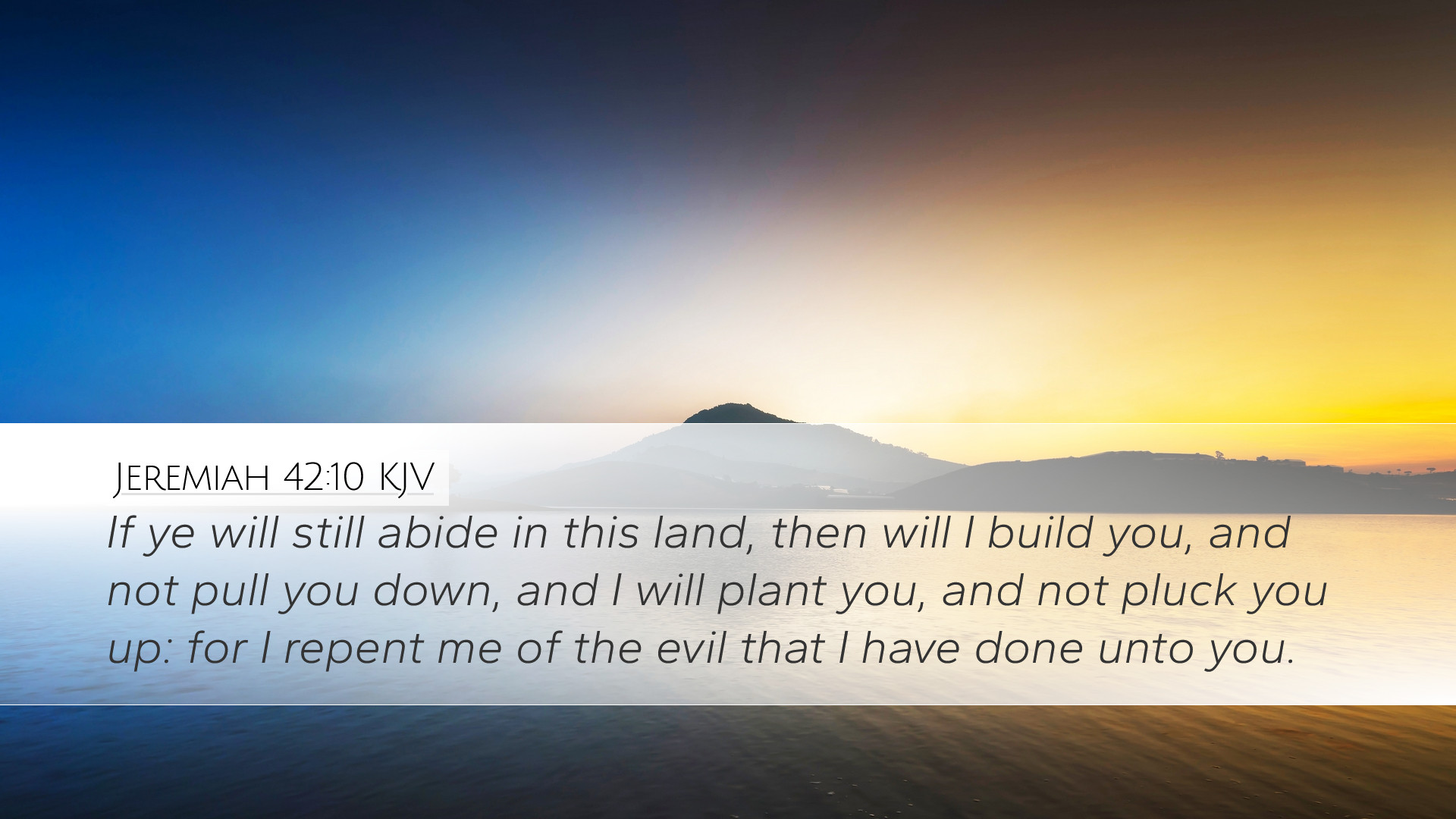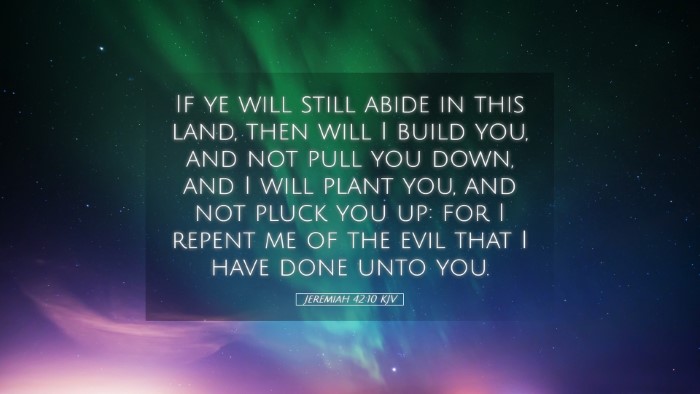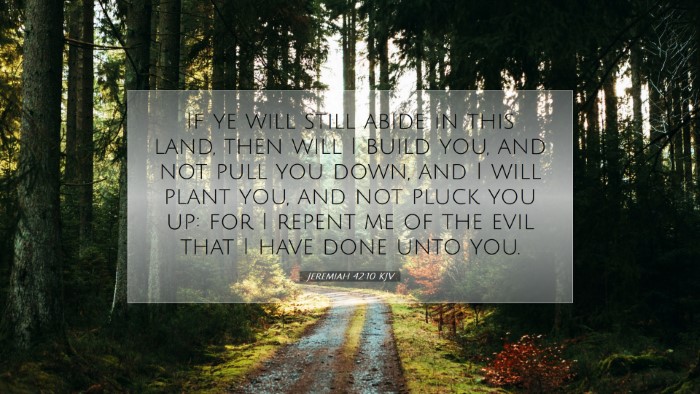Commentary on Jeremiah 42:10
Verse: "If you will still remain in this land, then I will build you and not pull you down; and I will plant you and not pluck you up; for I repent of the evil that I have done unto you." (Jeremiah 42:10, KJV)
Introduction
Jeremiah 42:10 stands as a potent message from God through His prophet amidst a turbulent time in Israel's history. In the wake of the Babylonian exile, the people of Judah wrestled with uncertainty about their future. This verse provides a divine assurance of restoration and hope, calling attention to God's willingness to redeem His people if they choose to remain faithful.
Contextual Analysis
This verse belongs to a larger narrative where a group of Israelites seeks guidance from Jeremiah after the fall of Jerusalem. They ask the prophet to inquire of the Lord regarding their future, particularly whether they should stay in the land or flee to Egypt. Jeremiah's response contains both warnings and promises, urging them to trust God's provision.
Historical Background
The historical context reveals that the Babylonians had conquered Jerusalem, leading to significant losses for the Israelites. Many feared further destruction and sought refuge in Egypt, showcasing their doubt in God's plans. This sets the stage for Jeremiah's proclamation, where God expresses His intention to bless them if they remain in their land.
Theological Insights
Conditional Promise
The promise laid out in Jeremiah 42:10 is conditional. God states, "If you will still remain in this land," indicating that the people's choice to stay put and trust God greatly influences their outcome. This reflects a significant theme throughout Scripture that emphasizes human responsibility in responding to divine invitations.
God's Grace and Restoration
The heart of this verse lies in God's grace. His willingness to "build you and not pull you down" signifies more than mere physical restoration; it implies a rebuilding of their spiritual identity and relationship with Him. Adam Clarke highlights this by noting that God’s repentance is not indicative of a change in His nature but demonstrates His compassion and prophecy that awaits their faithfulness.
The Significance of 'Building' and 'Planting'
In biblical terms, the notions of "building" and "planting" carry deep agricultural and architectural significance. The use of these metaphors illustrates God’s intent to establish a community that flourishes under His protection. Matthew Henry rightly points out that these verbs suggest permanence and growth, contrasting the destruction that the people fear. God assures them that He will bring about a strong future if they heed His words.
The Theme of Repentance
The declaration, "for I repent of the evil that I have done unto you," raises theological questions about divine repentance. Albert Barnes explains that this reflects God's desire to shift from judgment to mercy, emphasizing His character as one who is willing to forgive and restore. This shows that God's judgments, although severe, serve a purpose in bringing His people back to Him.
Pastoral Applications
Encouragement in Adversity
Pastors can find a rich source of encouragement through this verse for those in their congregations facing discouragement or uncertainty. Just as God promised to restore the Israelites, similarly, believers today can cling to the hope that God desires to build and plant in their lives despite challenging circumstances.
Faith in God's Plans
This text challenges both leaders and individuals to trust in God’s plans over their own wisdom. In times of decision-making, the contemporary church can learn from the Israelites' initial doubt. Encouraging congregants to seek and trust God's guidance can help foster a church culture anchored in faith.
Dialogue with God
Jeremiah’s role exemplifies the importance of prayer and dialogue with God. Pastors should encourage their communities to prayerfully consider decisions, trusting that God will guide and provide assurance even amidst perilous times.
Scholarly Reflections
The Nature of Divine Promises
Scholars often note the layered complexity of divine promises in Scripture. The conditionality of God's blessings in Jeremiah 42:10 ushers a profound discussion around the covenant relationship between God and Israel. It mirrors the broader relationship dynamics where accountability coexists with grace.
Ethical Implications
This verse fosters a discourse on ethical decision-making rooted in faith. The choice of the people to either remain and trust God or flee and embrace fear not only impacts them but also carries theological implications about disobedience and the heart posture towards God’s directives.
Conclusion
In summary, Jeremiah 42:10 is a rich tapestry interwoven with themes of divine grace, human choice, and the intricate workings of God's covenant relationship with His people. Its lessons remain timeless, inviting believers, scholars, and leaders to engage deeply with the transformational promises of God. Just as He called Israel to remain faithful amidst uncertainty, He invites us to trust in His goodness and provision today.


